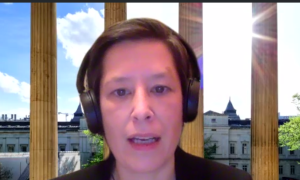The Catalunya Europa Foundation and Horizó Europa inaugurate "Cafè Europa", a new virtual series to reflect on the most current European issues, with the familiarity and company of a coffee
Uta Staiger, director of the European Institute at University College London (UCL), has been the first guest of a series about Europe that takes place every last Friday of the month. Staiger has dedicated the first coffee to reflect on one of the hottest topics in Europe, the present and the future of Brexit, in a session moderated by Javier Arregui, director of the Barcelona Center for European Studies (UPF).
Staiger pointed to the multiple causes of Brexit, a deficit in democratic legitimacy and the financial crisis, which has highlighted differences in growth patterns between countries. During the negotiations, he says, "the EU remained admirably united," despite the difficulties that states have in coordinating decisions taken in Brussels and justifying them at the domestic level.
Staiger acknowledges that the younger generations are much more pro-European than the previous ones, but rules out a possible reinstatement of Britain in the group of 27 over the next few years, as British society is still very divided. And yet another open front, Wales and especially Scotland, very critical of the internal market law. An unrest that is favoring the nationalist parties in both territories.
For his part, Javier Arregui highlighted Britain's lack of interest in the European project. "Beyond the part related to economic growth and the common market, the United Kingdom has never been interested in the Europe project," said the director of the Barcelona Center for European Studies.
The effects of Brexit, though little noticeable, Staiger said. The British economic reality is not easy, but it is too early to determine whether it is a short-term adjustment or a phenomenon with long-term consequences. It is also true that the situation caused by the Covidien-19 pandemic has overshadowed some of the changes brought about by Brexit, freedom of movement or restrictions on the market for goods and services.
Today, Brexit still has more questions than answers. Attendees at this first virtual café raised questions about the possible reduction of labor rights in Britain to climate policy. For Staiger, British pragmatism would not tolerate a position of open confrontation at the union level. And in terms of climate policy, the United Kingdom intends to lead the fight against this global emergency. In any case, Europe and the United Kingdom are doomed to understand each other, the challenges are too great to face individually and dialogue will have to continue.








